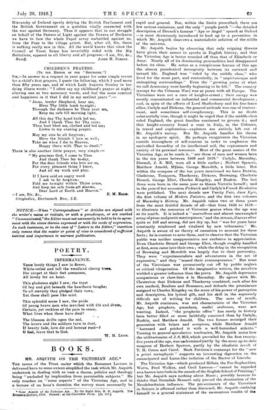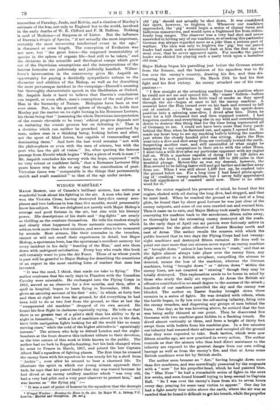BOOKS.
MR. ASQUITH ON THE VICTORIAN AGE.• THE terms of the Trust under which the Romances Lecture is delivered have to some extent simplified the task which Mr. Asquith undertook in dealing with so vast a theme, politics and theology being " excluded by implication from permissible subjects." He only touches on " some aspects " of the Victorian Age, and in a lecture of an hour's duration the survey must necessarily be .
• Some Aspects of the Victorian Age. . By the Right Bon.-11.. R. Asquith. The Reigalies Lecture, 1918, Ortord : at the Clarendon Pmts. Vs. net4
rapid and general. But, within the limits prescribed, there are few serious omissions, and the only " purple patch "—the detailed description of Disraeli's famous " Ape or Angel " speech at Oxford —is most dexterously introduced to lead up to a peroration in which Mr. Asquith disavows a materialistic solution of the riddle of the universe.
Mr.- Asquith begins by observing that only reigning Queens have given their names to epochs in English history, and that the Victorian Age is better rounded off than that of Elizabeth or .Anne. Nearly all of its dominating personalities had disappeared before its close. He notes as a conspicuous feature of this age the almost paradoxical incongruity between its outward and inward life. England was " ruled by the middle class," who lived for the most part, and contentedly, in " unpicturesque and uninspiring surroundings." Even the " growing pains of what we call democracy were hardly beginning to be felt." The country (except for the Crimean War) was at peace with all Europe. The Victorians were not a race of knights-errant ; their energy was mostly concentrated on industrial and commercial development ; and, in spite of the efforts of Lord Shaftesbury and his free-lance allies, Carlyle and Dickens, the general attitude was one of content- ment, and sometimes self-complacency. This is no doubt substantially true, though it might be urged that if the middle class ruled England, the great families continued to govern it ; and that knight-errantry found a vent in Italy, in the Colonies, in travel and exploration—explorers are entirely left out of Mr. Asquith's survey. But Mr. Asquith handles his theme in no apologetic spirit. He perhaps exaggerates the Victorian outside atmosphere of self-content in order to emphasize the unrivalled fecundity of its intellectual soil, the copiousness and variety of its personal resources. Most of the great names of the Victorian Age, as he reads it, " are those of men and women born in the ten years between 1809 and 1819." Carlyle, Macaulay, Disraeli, J. S. Mill, were all a little earlier ; Herbert Spencer, Matthew Arnold, Wilais, George Meredith, a little later. But within the compass of the ten years mentioned we have Darwin, Gladstone, Tennyson, Thackeray, Dickens, Browning, Charlotte Brontii, George Eliot, Charles Kingsley, and Ruskin. The last three were born in the same year as Queen Victoria herself ; and in the year of her accession Pickwick and Carlyle'sFrench Revolution were published. The next decade saw Vanity Fair, Jane Eyre, the first volume of Modern Painters, and the first two volumes of Macaulay's History. Mr. Asquith takes two or three years from the most fruitful decade of all—that from 1850 to 1859— to illustrate the resources of Victorian genius when the age was at its zenith. It is indeed a " marvellous and almost unexampled array of prose and p oet ic masterpieces," and the stream, if never after quite so full and strong, did not dry up, but " was for years later constantly reinforced and vitalized by new tributaries." Mr. Asquith is aware of no theory of causation to account for these facts ; he is content to note them, and to observe that the Victorian public was neither unappreciative nor exclusive in appreciation. Even Charlotte Brontii and George Eliot, though roughly handled at first, soon came into their own ; while the delay in the recognition of Browning and Meredith was largely due to their perversity. They were " experimentalists and adventurers in the art of expression," and they "teased their contemporaries." But none of the Victorians was prematurely cut off by public neglect or critical vituperation. Of the imaginative writers, the novelists wielded a greater influence than the poets. Mr. Asquith deprecates comparisons or class-lists a la Macaulay. He agrees with Mr. Chesterton that Dickens and Thackeray combined, each after his own method, Realism and Romance, and defends the prominence assigned to Charles Kingsley on the score of his power of perception and description, his lyrical gift, and his skill in the supremely difficult art of writing for children. The note of revolt, Mr. Asquith continues, was not characteristic of the Victorian Age, but prophets, preachers, ma/lei atultorum, were not wanting. Indeed, "the prophetic office" has rarely in history been better filled or more faithfully exercised than by Carlyle, Ruskin, and Matthew Arnold. The two former scourged their generation with briars and scorpions, while Matthew Arnold " harassed and pricked it with a well-burnished stiletto." Turning to general speculative tendencies, Mr. Asquith notes how the utilitarianism of J. S. Mill, which prevailed for the first twenty- five years of the age, was undermined partly by the more up-to-date weapons of Herbert Spencer, partly by the idealistic revolt of T. H. Green and Caird. Mark Pattison's contempt for the " new a priori metaphysic " suggests an interesting digression on the emancipated and Lama-like isolation of the Rector of Lincoln.
The Victorian Age—which produced Millais, the Pre-Raphaelites, Watts, Fred Walker, and Cecil Lawson—" cannot be regarded as a barren interlude in the annals of the English School of Painting," but Mr. Asquith says nothing about Music ; possibly because he thinks that Sterndale Bennett only proved the domination of the Mendelssohnian influence. The pre-eminence of the Victorianir in Science is affirmed rather than discussed, Mr. Asquith confining himself to a general statement of the momentous results of the researches of Faraday, Joule, and Kelvin, and a citation of Huxley's estimate of the less, not only to England but to the world, involved in the early deaths of W. K. Clifford and F. M. Balfour. Nothing is said of Medicine—of Simpson or of Lister. But the influence of Darwin's Origin of Species, " if not actually the most important, certainly the most interesting intellectual event in the age," is discussed at some length. The conception of Evolution was not new, but " the great fence—the supposed immutability of species in the sphere of organic life—had still to be taken," and the divisions in the scientific and theological camps which grew out of the Darwinian assumptions and the interpretations of the famous formulae are judiciously and judicially handled. Wilber- force's intervention in the controversy gives Mr. Asquith an opportunity for paying a decidedly sympathetic tribute to the character and abilities of the Bishop, as well as for describing the most picturesque incident in the campaign—Disraeli's amazing but thoroughly characteristic speech in the Sheldonian at Oxford. Mr. Asquith finds it hard to believe that Darwin's conclusions can imperil, or even affect, men's conceptions of the real place of Man in the hierarchy of Nature. Biologists have been at war ever since. But, in the general sphere of thought, he holds that Huxley put the matter on its right footing in his Romanes Lecture, his thesis being that " (assuming the whole Darwinian interpretation of the cosmic chronicle to be true) ethical progress depends not on imitating the cosmic process but on defeating it.' That is a doctrine which can neither be preached to nor practised by man, unless man is a thinking being, looking before and after, not the sport of blind forces, but capable of transcending and dominating them." And here the last word remains " not with the philosophers or even with the men of science, but with the poet who has the gift of vision." So, after quoting the famous passage from Hamlet which begins " What apiece of work is man ! " Mr. Asquith concludes his survey with the hope, expressed " with no very robust or confident faith," that a Romanes Lecturer fifty years hence may be able to say that the contribution of post- Victorian times was " comparable in the things that permanently enrich and exalt mankind " to that of the age under review.



























 Previous page
Previous page